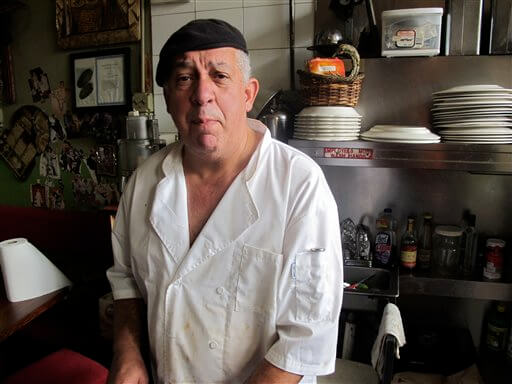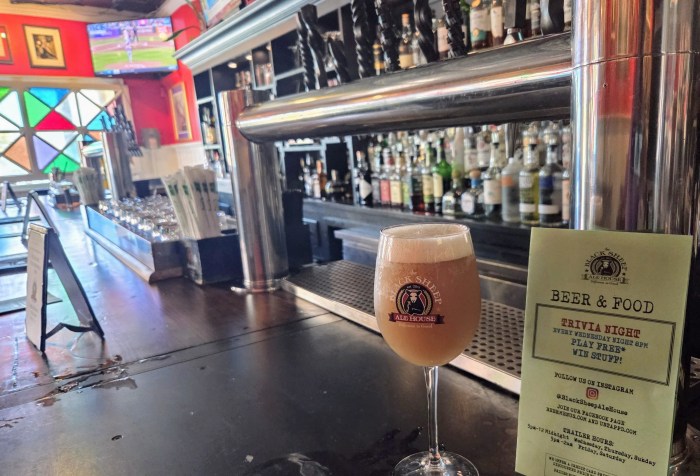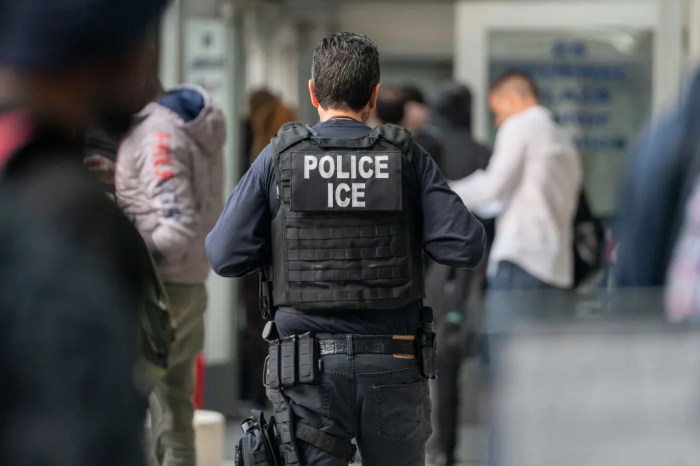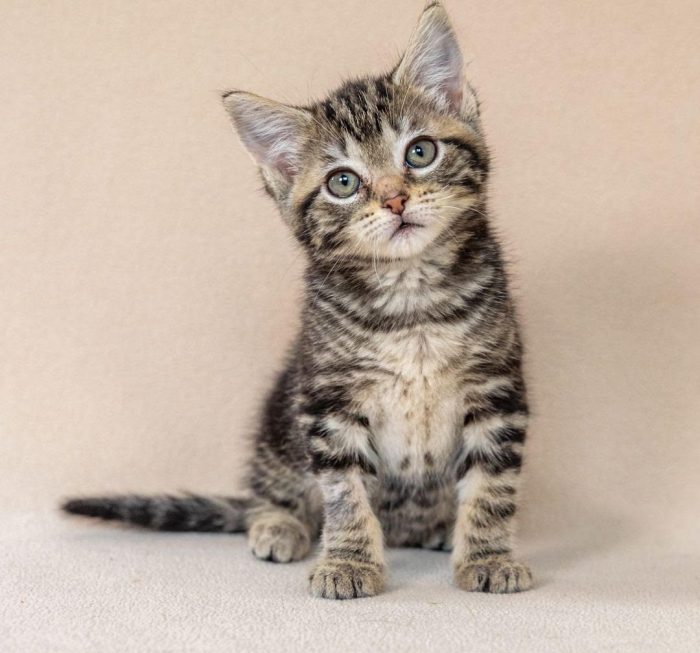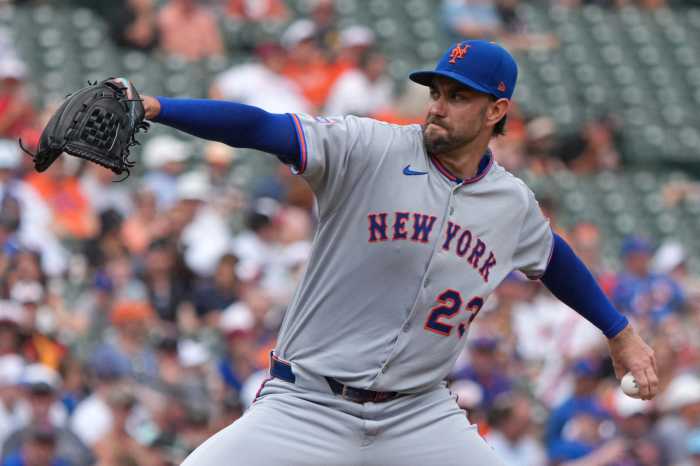
Vicki Grouzis shook her head in disbelief. Police are watching Arabs and Muslims in New York City? Often with no evidence of wrongdoing?
She frowned and dismissively waved a hand in the air.
“It’s a free country. This is not supposed to happen in America,” said Grouzis, who came here from Greece 35 years ago. And yet …
“I say yes, and I say no. It’s good for the United States, but not good for everybody.”
There is an ambivalence among many New Yorkers in the wake of an Associated Press investigation showing that after 9/11, police began spying on Muslim and Arab neighborhoods, often based only on ethnicity. The competing impulses of civic welcome and civic safety are evident throughout the boroughs.
Suspicion has long been part of the New York immigrant experience. From Italians accused of pledging allegiance to the pope to Germans feared to be signaling submarines outside the harbor, many newcomers have struggled to prove themselves truly American — especially in times of conflict.
Grouzis knows this history. She also knows that today, New York is filled with ethnic groups who overcame obstacles to carve out influential spaces in city life — Italians, Jews, Irish, blacks, Asians, Puerto Ricans and more.
“The people make this city great,” Grouzis said from behind the counter of a dry cleaning and tailor shop in the Astoria neighborhood of Queens. Outside the front window was a busy Steinway Street, lined with businesses including numerous Arab shops and cafes; Brazilian markets; a tae kwon do studio; a Mexican hookah cafe; Italian coffee shops; a Domino’s and Dunkin’ Donuts; Chinese and French restaurants; and Sissy McGinty’s Irish bar.
Many New Yorkers, remembering the immigrant story of struggle followed by success, speak of the NYPD surveillance almost like a rite of passage — even as they decry it as unjust.
“It takes awhile for any new nationality to assimilate,” said Nancy Cogen, who for 39 years has owned The Melting Pot, a batik clothing store near downtown Brooklyn. “It used to be the Irish, Germans, Puerto Ricans. Now I guess it’s the Arab world’s turn.”
Like most people interviewed for this story, Cogen did not think the current surveillance should be legal: “I don’t want to live in a police state, and I don’t think any religion or nationality should have to.”
But she said that since 9/11, she has become more willing to tolerate intrusions for safety’s sake. “We have no privacy anymore,” she said.
One place with less privacy is the section of Steinway Street with a heavy Arab and Muslim presence. It was targeted by NYPD surveillance and many photographs were taken there, according to documents obtained by the AP.
Inside the Kabab Café on Steinway, Ali A El Sayed pointed to an “Ethnic Map of Manhattan” on the wall of the narrow restaurant he has owned for 25 years.
Dated 1919, the map delineated color-coded neighborhoods for groups such as Germans, Russian Jews, Austro-Hungarians, Negroes, and one called “Syrians, Turks, Armenians and Greeks.”
“Everything colored in on that map was bad,” said Sayed, who came here from his native Egypt 35 years ago.
He was not surprised that police were watching his neighborhood — it’s common knowledge among Muslims that they are under surveillance. But he was angered and saddened by what he saw as a failure to respect the American ideal of freedom.
“In 2011, all this commotion about a black president, and we still have police stopping a guy because of his race,” Sayed said.
“It’s time to correct our vision,” he said. “In this country, Middle Eastern guys are mostly small guys, small businesses, trying to make a living for their families.”
Many of the surveillance operations were built with help from the CIA, which is prohibited from spying on Americans but helped transform NYPD intelligence after 9/11.
The program sent undercover officers into Muslim and Arab neighborhoods. Informants infiltrated mosques and student groups. People who changed their Muslim names to ones that sound more traditionally American — a timeless method of assimilating into this country — were placed on secret lists.
Molly Seitz, who moved to New York 17 years ago, said her Irish great-grandfather couldn’t get hired on the docks of Boston, so he changed his name.
“This (suspicion) has been happening since the beginning of time,” Seitz said as she ate lunch near downtown Brooklyn with a friend.
The two women did not want police to single out suspects based only on religion or ethnicity. But “we just need a way to strike a balance. You can’t deny there’s danger,” Seitz said.
Some had no problem with what police are doing, calling it justified to protect against the danger of another terrorist attack.
“It’s sad to pick them out. I don’t feel just because they’re Muslim they’re bad,” said Joe Giallo, a New York native and owner of a Brooklyn antique store.
“But if the police feel any Muslim has to be pulled out, they should,” he said. “I still think it’s safer that way. It’s better to be sure than not sure.”
Lynn Villafane, a waitress who lives in Manhattan, said innocent people should have nothing to hide.
“I see it both ways,” she said. “It’s the protection of the country, but it’s kind of invading their privacy. But in the long run, as long as we’re safe, they’re doing it for good reasons.”
“If (an attack) happens again, they’ll blame the government, the police, and say ‘why weren’t you watching?'” Villafane said.
Other minorities have complaints about New York police; blacks and Hispanics say they are subject to unwarranted police intrusions, including a “stop-and-frisk” policy targeting anyone deemed suspicious. Police defend those strategies as necessary to combat crime, while the surveillance operations, they say, are important to secure a city that was the target of terrorists.
Evan Milligan, an Alabama native now in law school at New York University, visited the city often in the mid-1990s, living for weeks at a time with his brother. Today, “I can tell 9/11 affected the psyche of the city. I can feel the difference.”
Yet he still feels that newcomers are welcome here, from Alabama and beyond.
“The soul of this city to me is its working people that built some of the most fascinating subways, bridges, tunnels, graffiti, culture, types of music, creative works,” Milligan said. “The people that work and build things across all walks of life, there’s that soul, like, we can do it. That soul is always welcoming people to New York.”
___
Copyright 2011 The Associated Press.




